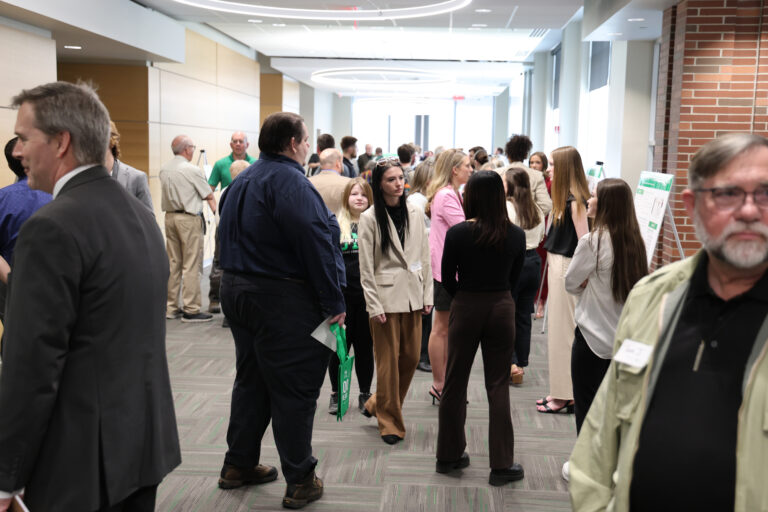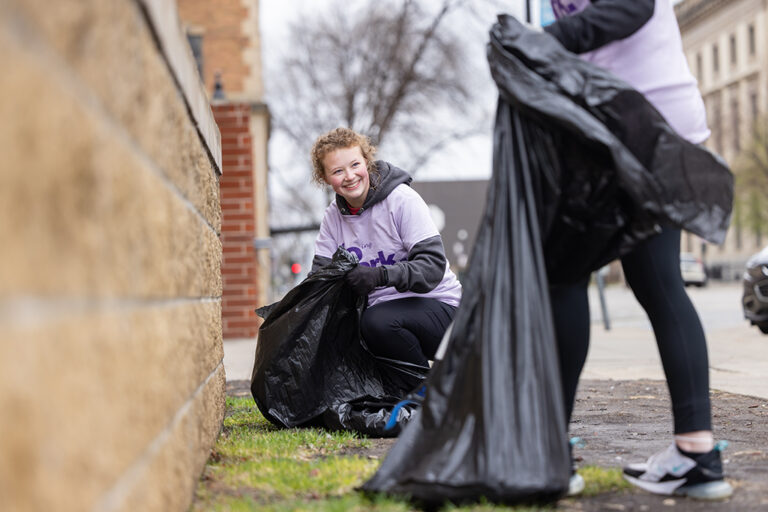UND panel provides ‘glimmer of hope’ for community in distress
Northern Lights Psychology Conference features panel focused on LGBTQ+ mental health

On Oct. 13, UND and Grand Forks community members gathered in the Memorial Union’s Henry Family Ballroom to explore the psychological effects of the recent North Dakota legislation on LGBTQ+ people in the state.
The panel was a part of the Northern Lights Psychology Conference, a daylong event hosted by UND’s Department of Psychology, which included a keynote speech from Mary Fristad, director of Academic Affairs and Research Development in the Division of Child & Family Psychiatry at Nationwide Children’s Hospital as well as presentations by psychology researchers.
Members of the panel included UND School of Law Assistant Professor Jen Cook, UND Honors Program Associate Professor Merie Kirby, Program Director of Chad Pitt of North Dakota Healthcare, Opportunity, Prevention and Education in Suicide Prevention (ND HOPES) , and local advocate and organizer Sarah Galbraith.
Tiffany Russell, an assistant professor of psychology specializing in LGBTQ+ mental health research, moderated the panel and gave a brief introduction to current research on rates of suicide and depression among North Dakota middle school students.
“In 2021, research found that 75% of trans students and 65% of lesbian, gay and bisexual students in North Dakota middle school students have considered suicide. Some 54% of trans students and 51% of lesbian, gay and bisexual students reported making a plan and starting to do actions that move toward suicide,” she explained.
Russell said these statistics become even more bleak as students enter high school. Bullying, harassment and feelings of isolation, she said, are the primary causes of mental health issues among LGBTQ+ students.
Further, Russell said that the recent passage of 10 bills, including House Bill 1297, which prohibits trans individuals from changing the sex listed on their birth certificates, has already had a “profound” impact on the mental health of members of the LGBTQ+ community.
Chad Pitts said recent developments have been “terrifying” for LGBTQ+ people in the state, who feel they already lack necessary resources. After the bills passed, he said, North Dakota’s 988 Suicide and Crisis Lifeline saw a significant uptick in calls from members of the LGBTQ+ community who were distressed by the legislative action.
Despite those circumstances, Pitts said he still hopes the LGBTQ+ community will remain resilient, primarily thanks to support networks in the state.
“One thing that this state is really good at is doing a lot of good work,” he said. “There are amazing people in this community who are putting the work in.”
Pitts referenced resources such as the 988 hotline; Parents, Families and Friends of Lesbians and Gays (PFLAG); and the Harbor Health Initiative, a directory of LGBTQ+ resources and organizations, as examples of support that students can turn to for help.
Russell said that one of the most important aspects of improving mental health for LGBTQ+ students is directing them toward spaces and communities where they can find a sense of belonging and camaraderie.
“Being around other members of the community allows you to all look at and accept each other for exactly who you are,” she said. “Being able to relax and take your guard down around other queer and gender and sexual minority people is so relieving.”
Merie Kirby, founder of the Greater Grand Forks Chapter of PFLAG, said she had noticed a trend in her classrooms. Many students from smaller areas with fewer dedicated LGBTQ+ resources often feel isolated and alone in their journeys, and offering acceptance allows them to feel more comfortable in the classroom and community.
“Showing in small ways that you’re somebody they can talk to, can have rippling repercussions,” she said.
Regarding the next steps that allies and LGBTQ+ people can take concerning the recent legislative changes, Jen Cook, who is the former policy director of the ACLU of North Dakota, said that elections are the best places to start implementing change.
“Local elections matter, and it matters who you vote for,” she said. “We have to choose our public officials carefully, and let the public know who they’re voting for and what their records are. If we don’t do that, we’re only left with the justice system, and that is a long and arduous process.”
Russell said that the outpouring of support from community spaces such as UND’s Pride Center and Archives Coffee House has been positive for LGBTQ+ students and faculty. But she affirms that the road ahead requires openness and support.
“Just being open to having this conversation makes sexual and gender minority students and faculty feel safer,” she said. “Finding ways to add small glimmers of hope to queer and trans and gender diverse people’s lives changes everything. It can change everything.”



